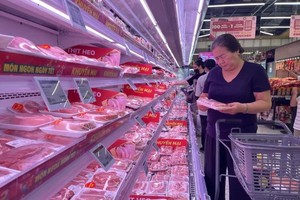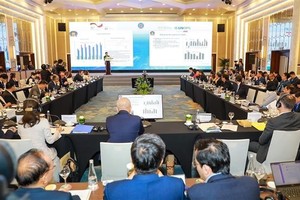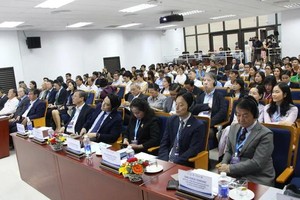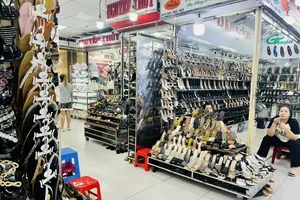 |
Reducing VAT by 2 percent is expected to stimulate consumption. |
On May 24, the National Assembly will be considering a proposal and reviewing a report regarding the extension of the 2-percent reduction in value-added tax (VAT) as per Resolution No.43/2022/QH15. This resolution pertains to fiscal and monetary policies that support the Socio-economic Recovery and Development Program. Numerous associations and experts emphasize the importance of continuing this policy in the present circumstances to boost consumer demand and revitalize production.
Stimulating consumption
According to Mr. Nguyen Dang Hien, Vice Chairman of the Ho Chi Minh City Food Association, the reduction of VAT from 10 percent to 8 percent is essential to stimulate domestic purchasing power.
Mr. Hien analyzed that businesses had encountered various challenges since late 2022. Notably, they had to contend with soaring costs of logistics, raw materials, fuel, and loan interest rates, leading to an increase of 20-30 percent in the cost prices compared to the beginning of 2022. Concurrently, both domestic and export markets have witnessed a significant decline in consumer demand.
Of particular concern are the three key markets, namely the United States, Europe, and China, which account for more than 60 percent of Vietnam's total export revenue. The demand in these markets has consistently contracted, exerting a noticeable impact on the production operations of domestic businesses.
Mr. Nguyen Ngoc Hoa, Chairman of the Ho Chi Minh City Union of Business Association, revealed that a recent survey on the current business operations in the area indicates that businesses are still grappling with difficulties and face a significant risk of market exit. The construction sector has witnessed a sharp 65 percent decline in orders, while the textile, garment, leather, and footwear industries have experienced a notable reduction of 40-50 percent. Moreover, the agricultural and food sectors, which usually maintained a double-digit growth rate for the past 20 years, have also encountered a slowdown, with growth dipping below 10 percent in the early months of this year.
If the VAT is reduced by 2 percent, there will be a decrease in revenue for the State budget, but this can be compensated by other revenue sources. For instance, a 2-percent reduction in VAT would lead to a decrease in product costs, encouraging consumers to increase their spending. This, in turn, would improve business orders, revive production activities, and create opportunities for an increase in tax contributions.
Mr. Nguyen Anh Duc, CEO of Saigon Co.op cum Chairman of the Vietnam Retailers Association, highlighted that to sustain purchasing power in the market, Saigon Co.op has collaborated with suppliers to stabilize prices and avoid price hikes. The company has also made efforts to minimize production and operational costs, effectively offsetting the reduction in product costs. Furthermore, the company has launched various discount programs to support consumer purchasing power. However, the retail industry still faces significant revenue challenges. Therefore, reducing VAT by 2 percent is necessary to provide support for businesses in stabilizing product prices and maintaining purchasing power.
Stronger tax reduction is necessary
Dr. Tran Du Lich, a member of the National Financial and Monetary Policy Advisory Council, said that while the revenue from goods and services experienced positive growth in the first quarter of 2023, it began to stagnate in April with extremely poor purchasing power. To expedite economic recovery, Dr. Tran Du Lich suggests the implementation of policies that enhance purchasing power in the market. This can be achieved through the joint efforts of the government and businesses, utilizing tools that stimulate domestic demand.
 |
Consumers buy ready-made food at a supermarket. |
Specifically, the government agencies should further study the possibility of reducing VAT by sector, as the current reduction to 8 percent is insufficient, and it should be lowered further to 5-6 percent to stimulate domestic market demand. Additionally, it is essential to promote consumer credit to boost consumption. Besides, businesses should be willing to accept price reductions to stimulate the market. In the current challenging export environment, if domestic market demand is not stimulated, it will have an impact on inventory and business operations.
National Assembly (NA) Delegate Le Thanh Van from Ca Mau Province, Standing Member of the National Assembly's Finance and Budget Committee, agreed with the government's proposal to reduce VAT. He even suggested a higher reduction at 3-5 percent. He also recommended extending the implementation period beyond the last six months of the year and into 2024. If implemented, it is estimated that this measure would result in a reduction of approximately VND75 trillion in budget revenue. However, it should be noted that the actual reduction may not be as substantial as initially projected.
Reducing taxes has the potential to lower costs, boost trade, increase sales, and stimulate economic growth. When businesses generate higher profits, they are more inclined to fulfill their tax obligations. However, if tax reductions are insignificant, the overall impact may be limited. Given the current circumstances, it is crucial to prioritize the well-being of the people.
Delegate Tran Hoang Ngan from HCMC also supports the need to continue reducing VAT. However, he believes that tax reduction alone can only partially stimulate domestic demand and encourage domestic consumption. The underlying issue is that even with lower product prices, individuals without sufficient financial resources will still struggle to make purchases.
Currently, there has been a decline in resources among the population, highlighting the importance of providing additional support packages. It is crucial to prioritize assistance for impoverished households, unemployed workers, families impacted by the Covid-19 pandemic, and those who have lost family members who were the main breadwinners in their families due to Covid-19.
On a different aspect, delegate Tran Van Lam from Bac Giang Province, Standing Member of the National Assembly's Finance and Budget Committee, believes that not all categories of goods and services require stimulus for consumption. In other words, it is not necessary to uniformly reduce taxes for all goods and services.
Therefore, the suggestion to expand the tax reduction beyond the scope of Resolution No.43/2022/QH15 is not entirely persuasive. If the banking, securities, and real estate sectors are grouped together for tax reduction without conducting a comprehensive assessment of the impact on each specific sector, it would be unreasonable. For now, it is advisable to implement VAT reduction within the scope defined in Resolution No.43/2022/QH15.
























